Since joining IDEMS in 2023, George has managed the IDEMS collaboration with CASAS Global to improve the accessibility and impact of ecosystem dynamics modelling. This has included the development of psymple, a Python-based modelling platform for complex systems, and joint research with the Topos Institute on the categorical structure of complex models.
His work bridges mathematical rigor with real-world application, advancing socially relevant outcomes through his advocation of open-source, collaborative approaches. He is committed to delivering research, training, and technology that support sustainable development and social impact.
George graduated with a PhD in Mathematical Sciences from the University of Southampton in 2023, where his research focused on algebraic topology and polyhedral products, and previously earned an MMath degree from the University of Warwick in 2018. George has always strived to work across traditional boundaries, both in his research and beyond, and now holds an expanding publication record across pure mathematics, population ecology, and research software.
Beyond his technical contributions, George has played a significant role in capacity-building through education by co-supervising MSc projects in Kenya and designing open online courses in climate data analysis and mathematical modelling. Notably, he served as an organiser for the Impact Activation Workshop for Mathematical Scientists, teaching transdisciplinary social impact skills.
What’s the most challenging project or problem you’re working on right now?
Our collaboration with CASAS Global is part of our wider work with the McKnight Foundation’s CRFS programme. Understanding how to bridge the gap between the research tools and methods pioneered by CASAS and how to use these methods to create impactful interventions at the level of local communities and farms, for example integrating with farmer research networks (FRNs) or with existing integrated pest management (IPM) schemes is an incredibly wide-ranging problem which has required, and will require, understanding, developing and trying many potential methodologies.
What social problem is nearest and dearest to you?
My passion has always been around education, but particularly around how to spread knowledge that enables people to make their own informed decisions, in their own contexts, so as to best enable their own economic and social development, security and mobility.
What role do you think tech can/should/could play in social impact?
I view technology as something with implicitly captures deep technical expertise and automates processes in a way such that orders of magnitudes more people are able to access and run them on their own. The most impactful tech should be open source and enable collaborative workflows which expose access points differently to different users in ways in which they can contribute their expertise, be that academic, developmental, data, or local knowledge.
What’s most surprising, unexpected or rewarding about working in transdisciplinary collaborations?
I love being able to visit and work with people with different experiences or backgrounds who approach these problems completely differently. In my short time at IDEMS I’ve already been lucky enough to travel to California, Italy, and Kenya to work side-by-side with world leaders. Finding ways to bridge those gaps in knowledge, language, experience or aims is a highly rewarding challenge. It’s always surprising to find out how many people have the same ideas and goals, and investing the time to make those connections has led to much deeper understanding between my collaborators and myself.
Where is home?
I did my undergraduate degree at the University of Warwick where I met my now-fiancé Amelia, and we’ve now set up home nearby in Leamington Spa with our cats Jaffa and Dodger. I switch off using exercise which allows me to travel and explore near and far: hiking, cycling, running, orienteering and, dodgy shoulder-dependent, the occasional game of squash. I am particularly passionate about the importance of blood donation, and I’ve been a regular platelet and plasma donor since 2020.


Leave a Reply